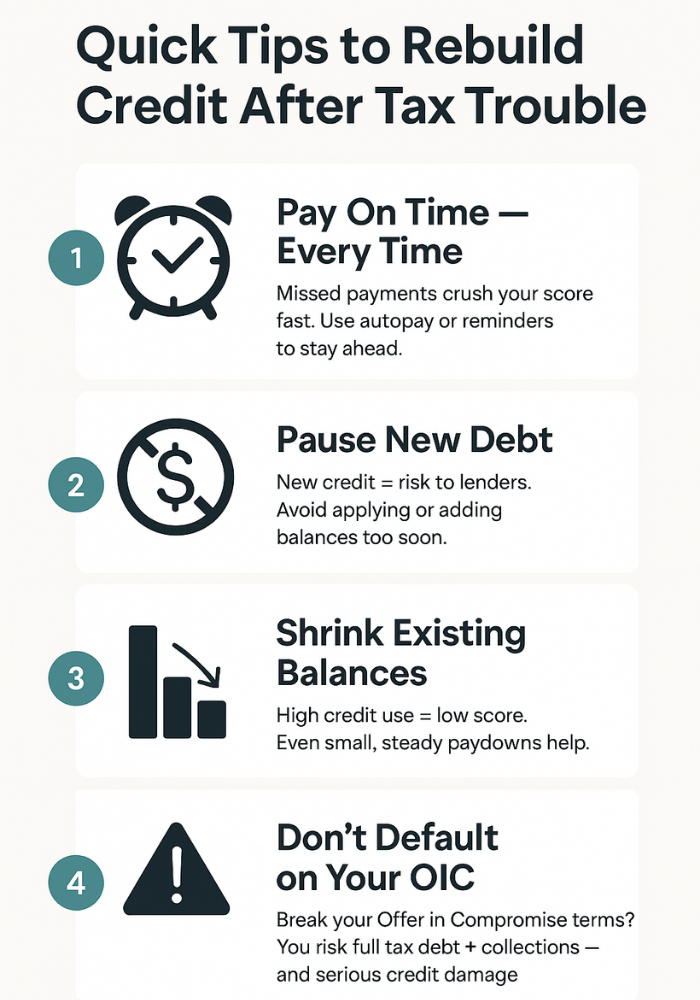No, an Offer in Compromise does not directly affect your credit score, and the IRS doesn’t report it to credit bureaus.
However, the financial circumstances leading up to an Offer in Compromise (OIC), like missed payments or tax liens, can still have an indirect impact on your credit. And while an OIC won’t show up on your credit report, lenders may still view it as a sign of financial stress.
In this article, we’ll break down exactly how an IRS Offer in Compromise works, what it does and doesn’t mean for your credit, and how to protect your financial profile if you’re considering one.
Talk to a J. David Tax Law attorney for a free OIC consultation now!
Understanding Offer in Compromise for Tax-Newbies
An Offer in Compromise (OIC) is a way to settle your tax debt with the IRS for less than the full amount you owe. It’s a formal agreement, not a temporary fix, and it only gets approved if the IRS determines that you truly can’t pay your full tax balance based on your financial situation.
To qualify, you’ll need to show that paying the full debt would cause serious financial hardship. That means the IRS will evaluate everything about your income, expenses, assets, and future earning potential.
While it’s not easy to get an offer approved, a successful OIC gives you a clean slate with the IRS. Once accepted and completed, your remaining tax debt is forgiven, and you can move forward without the burden of ongoing IRS collections.
The IRS is Forgiving Millions Each Day. You Could Be Next.
How Credit Reports Work
To understand how an Offer in Compromise might affect your credit, it helps to know what actually appears on your credit report in the first place.
Your credit report tracks debt that involves lenders, like credit cards, auto loans, mortgages, and collections. But the IRS isn’t a lender, and it doesn’t report tax debt or settlement agreements like an OIC to the credit bureaus.
That means your Offer in Compromise won’t show up on your credit report, and it won’t directly raise or lower your credit score.
However, other tax-related issues, like liens or unpaid balances, can still affect your financial standing in ways lenders may notice.
Does an Offer in Compromise Show Up on Your Credit Report?
To reiterate, no. The IRS does not report Offers in Compromise to the major credit bureaus, and they won’t appear as entries on your credit report.
However, if the IRS filed a Notice of Federal Tax Lien before your OIC was accepted, that lien could still show up in public records and may have already impacted your credit in the past. While tax liens are no longer included in credit reports by most major bureaus, some lenders may still search public records during the underwriting process.
So while the OIC itself won’t hurt your credit score, the events surrounding it, like missed payments, collection actions, or prior lien can leave a mark depending on your history.
Indirect Impact of an Offer in Compromise on Your Finances
We’ve established that even though an Offer in Compromise doesn’t show up on your credit report, it can still affect how lenders view you, especially during applications for loans, mortgages, or business credit.
Some lenders may request IRS transcripts, past tax documents, or financial disclosures as part of their approval process.
If they see that you settled a tax debt for less than the full amount, they may consider it a red flag for financial instability, even if your credit score is solid.
Also, the factors that led to the OIC, like past missed payments, cash flow problems, or IRS enforcement, can all shape how financially reliable you appear, especially for major lending decisions.
How to Protect or Rebuild Your Credit After an OIC
An Offer in Compromise gives you a fresh start, but what you do next will shape how quickly you recover financially. Here’s how to protect and rebuild your credit after settling with the IRS.

When an OIC Makes More Sense Than Protecting Your Credit
If you’re deep in tax debt, your credit score isn’t the only thing at risk. The IRS can garnish wages, levy bank accounts, and place liens on your property all without needing a court order.
In most cases, resolving the tax debt through an Offer in Compromise is more important than preserving a few points on your credit report. Lenders can work with you if your credit isn’t perfect. The IRS won’t be as forgiving if you ignore your balance.
An OIC won’t fix everything overnight, but it gives you breathing room and a clear path forward. That’s often worth far more than a short-term dip in your financial profile.
Get a free consultation at J David Tax Law before you file for an Offer in Compromise.



















